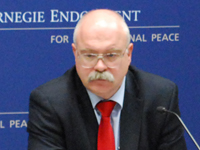Registration
You will receive an email confirming your registration.
IMGXYZ2336IMGZYXThe U.S.-Russian relationship has notably improved since President Obama took office, and the process of the “reset” still continues. Carnegie Moscow’s Dmitri Trenin discussed some of the most crucial areas for the relationship for 2010, including cooperation on Afghanistan and Iran, future developments in Georgia and Ukraine, and discussions of a new European security system inclusive of Russia.
The First Year
The general atmosphere in Moscow is markedly different from what it was in 2008. Russia welcomes the changes in the U.S.-Russian relationship, but the process is far from complete. The biggest achievements of the reset in its first year include:
- The establishment of a renewed, strong, and “de-personalized” top level relationship that better meets the needs of both countries.
- President Obama’s visit to Russia in July 2009, during which he listened to Prime Minister Putin’s concerns over a breakfast meeting that helped defuse a strained relationship between the two countries.
Trenin explained, “We are moving toward a more mature relationship between the United States and Russia, maybe for the first time since the end of the Soviet Union.”
START
One of the main factors contributing to the protracted negotiations over the arms reduction treaty is that the strategic force development programs of the U.S. and Russia are at different phases. The United States is focused on defensive programs, while Russia is focused on offensive ones. In the past, both countries were largely focused on the same issues at the same time: developing missiles, producing missiles, and testing missiles. Now, the treaty that addresses offensive methods, but does not address defensive systems, is seen by the Russians as putting Russia at a disadvantage. Trenin predicted that:
- The treaty will be concluded within the next couple of months.
- This will be the last arms reductions treaty that Russia will sign for the foreseeable future because the next reduction treaty would be seen to cut into Russia’s deterrence capacity.
Afghanistan
There is limited but genuine cooperation between Russia and the United States on Afghanistan. The two countries have different strategies to address drug production in Afghanistan: the United States is focused on interdiction, while Russia is focused on elimination. Trenin explained that this issue is quite significant for Russia, as Russia is a main victim of Afghan heroin. Shared priority for this matter creates an opportunity for further cooperation with the United States.
Iran
Russia has a different assessment of Iran, its leadership, its future, and its potential than that of the United States. Russia shares the international concern over Iran’s nuclear program, but the Russians disagree with the United States over how to manage Iran’s nuclear ambitions or whether Iran’s development of a nuclear weapon can be stopped at all.
Georgia
A former flashpoint between the United States and Russia, Georgia has not been at the forefront of U.S.-Russian relations in 2009. The United States has assured Russia that their efforts in training Georgian troops and resupplying the Georgian military are not meant to enable Georgia to wage war against Russia. Trenin suggested that this issue still has the potential to do damage to U.S.-Russian relations, if left unattended.
Ukraine
In the wake of the recent Ukrainian elections, Ukraine’s foreign policy is becoming less ideological and much more pragmatic. A commission has already been created to provide a framework to sustain a better Ukrainian-Russian bilateral relationship.
European Security
Russia must play a part in any meaningful European security system. Trenin thinks that Medvedev’s recently proposed security plan is flawed, and it is thus easy to dismiss Medvedev’s proposed treaty, but the idea of a European security system that includes Russia should not be rejected. Finding the right formula will not be easy, however. Trenin identified two parallel obstacles to successful development of a new European security system:
- Russian paranoia over U.S. intentions: this concern is demonstrated by Russia’s resistance to the enlargement of NATO, its suspicions over orange revolutions and over U.S.-Georgian relations, and its worries about missile defense. Dispelling this paranoia in the Russian mind will be principally a responsibility for the United States.
- Central and Eastern European paranoia over Russia: this concern is almost as intense and as baseless as Russia’s paranoia about the United States, but is an equally real political fact. Dealing with this paranoia, Trenin stated, will be the responsibility of Russians, and they must reach out to the Poles, the Balts, and others in the region.
Trenin concluded by saying that the modern Russia “is a great power, if great power means strategic independence and decision making. But it is no longer the “all-powerful” Soviet Union in terms of GDP, or in terms of population, or in terms of military might. Slowly but surely, Russia will emerge in 2010 as a very different country from what it is today, and that is a very good thing.”
